nuclear energy
核能的优点和缺点是什么英语作文
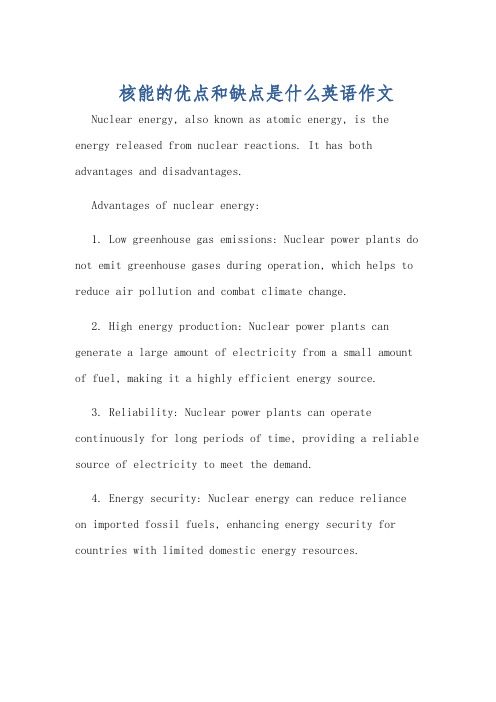
核能的优点和缺点是什么英语作文Nuclear energy, also known as atomic energy, is the energy released from nuclear reactions. It has both advantages and disadvantages.Advantages of nuclear energy:1. Low greenhouse gas emissions: Nuclear power plants do not emit greenhouse gases during operation, which helps to reduce air pollution and combat climate change.2. High energy production: Nuclear power plants can generate a large amount of electricity from a small amount of fuel, making it a highly efficient energy source.3. Reliability: Nuclear power plants can operate continuously for long periods of time, providing a reliable source of electricity to meet the demand.4. Energy security: Nuclear energy can reduce reliance on imported fossil fuels, enhancing energy security for countries with limited domestic energy resources.5. Economic benefits: Nuclear power plants create jobs and stimulate economic growth in the communities where they are located.Disadvantages of nuclear energy:1. Radioactive waste: Nuclear power plants produce radioactive waste that remains hazardous for thousands of years, posing a significant environmental and public health risk.2. Nuclear accidents: The potential for catastrophic events, such as meltdowns or reactor failures, can have devastating consequences for the environment and human health.3. High cost: The construction and maintenance of nuclear power plants require substantial investment, making nuclear energy relatively expensive compared to other energy sources.4. Limited uranium supply: The availability of uranium, the fuel used in nuclear reactors, is finite, raising concerns about long-term sustainability and resource depletion.5. Security risks: Nuclear facilities and materials are vulnerable to terrorist attacks and theft, posing a threatto national security.核能的优点和缺点如下:优点:1.低温室气体排放:核能发电厂在运行过程中不会排放温室气体,有助于减少空气污染,应对气候变化。
各种能源的英文表达

各种能源的英文表达
以下是各种能源的英文表达:
1. 煤炭: coal
煤炭是一种化石燃料,采用开采和运输,以供发电、加热和工业用途。
2. 石油: petroleum,oil
石油是一种重要的化石燃料,被用来产生能量、加热和生产化学品以
及润滑油和石油产品。
3. 天然气: natural gas
天然气是一种清洁的化石燃料,常用于发电和取暖,还被用作工业和
交通燃料。
4. 核能: nuclear energy
核能是一种利用核反应产生的能量,被用来发电和供应能源,但也有
争议,由于核事故的危险性。
5. 太阳能: solar energy
太阳能是一种可再生的能源,被用来发电和供应能源,同时也有用于
热水和空调等方面,无二氧化碳排放。
6. 风能: wind energy
风能是一种可再生的能源,通过利用风力发电,是免费的,无二氧化碳排放。
7. 生物质能: bioenergy
生物质能是一种可再生能源,通过转化生物质来产生能量,包括可生物降解的废弃物,例如农业和食品废物以及木材。
8. 水能: hydropower
水能是一种可再生能源,通过水的力量产生电能,利用水电站和水轮发电。
总的来说,以上的能源种类,每一种都有其独特的特点和应用领域,我们应该根据实际情况寻找最佳方案,为保护环境、节约资源贡献力量。
核能的优点和缺点是什么英语作文
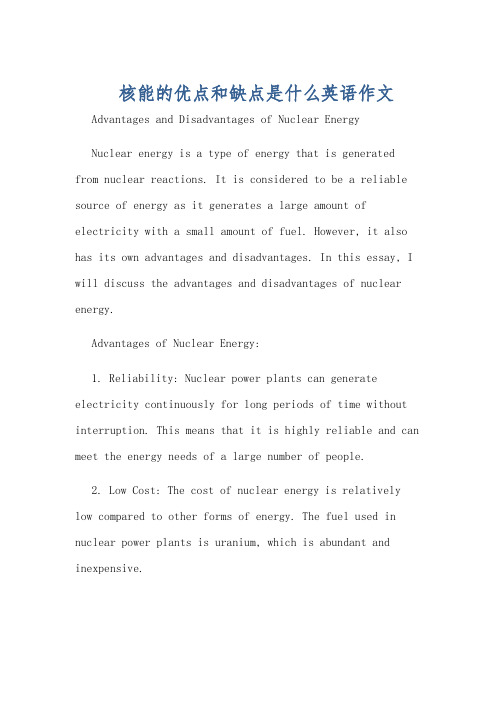
核能的优点和缺点是什么英语作文Advantages and Disadvantages of Nuclear EnergyNuclear energy is a type of energy that is generated from nuclear reactions. It is considered to be a reliable source of energy as it generates a large amount of electricity with a small amount of fuel. However, it also has its own advantages and disadvantages. In this essay, I will discuss the advantages and disadvantages of nuclear energy.Advantages of Nuclear Energy:1. Reliability: Nuclear power plants can generate electricity continuously for long periods of time without interruption. This means that it is highly reliable and can meet the energy needs of a large number of people.2. Low Cost: The cost of nuclear energy is relatively low compared to other forms of energy. The fuel used in nuclear power plants is uranium, which is abundant and inexpensive.3. Low Pollution: Nuclear power plants do not emit greenhouse gases or other pollutants into the atmosphere. This makes it an environmentally friendly form of energy.4. High Energy Density: The energy density of nuclear fuel is very high, which means that a small amount of fuel can generate a large amount of energy.5. Energy Independence: Nuclear energy can reduce a country's dependence on imported oil and gas.Disadvantages of Nuclear Energy:1. Nuclear Accidents: Nuclear accidents, such as the Chernobyl disaster and the Fukushima Daiichi nuclear disaster, have caused significant damage to the environment and human health.2. Radioactive Waste: Nuclear power plants produce radioactive waste, which is extremely hazardous and can remain radioactive for thousands of years.3. High Initial Costs: The construction of a nuclear power plant is very expensive. The initial cost of building a nuclear power plant is much higher than that of building a conventional power plant.4. Proliferation of Nuclear Weapons: The use of nuclear technology for energy purposes can also lead to the proliferation of nuclear weapons.5. Risk of Terrorism: Nuclear power plants are potential targets for terrorist attacks. A successful attack on a nuclear power plant could have catastrophic consequences.总结:从上面我们可以得出,核能的优点是可靠性高,成本低,污染低,能量密度高和独立性强。
翻译(排序版)核专业英语~nuclear energy
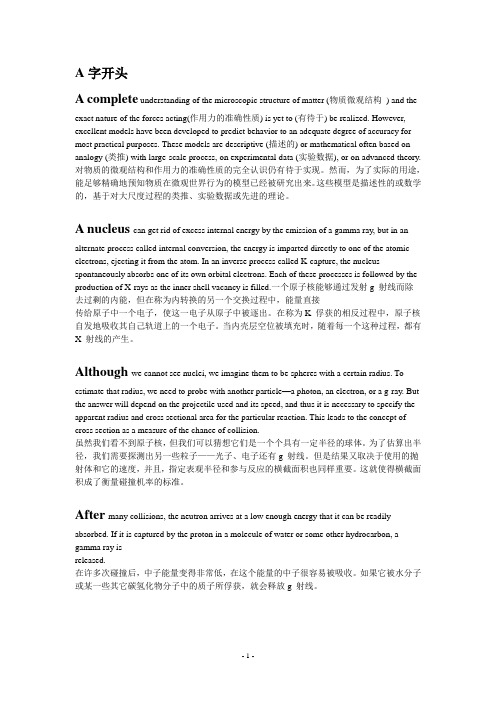
A字开头A complete understanding of the microscopic structure of matter (物质微观结构) and the exact nature of the forces acting(作用力的准确性质) is yet to (有待于) be realized. However, excellent models have been developed to predict behavior to an adequate degree of accuracy for most practical purposes. These models are descriptive (描述的) or mathematical often based on analogy (类推) with large-scale process, on experimental data (实验数据), or on advanced theory.对物质的微观结构和作用力的准确性质的完全认识仍有待于实现。
然而,为了实际的用途,能足够精确地预知物质在微观世界行为的模型已经被研究出来。
这些模型是描述性的或数学的,基于对大尺度过程的类推、实验数据或先进的理论。
A nucleus can get rid of excess internal energy by the emission of a gamma ray, but in analternate process called internal conversion, the energy is imparted directly to one of the atomic electrons, ejecting it from the atom. In an inverse process called K-capture, the nucleus spontaneously absorbs one of its own orbital electrons. Each of these processes is followed by the production of X-rays as the inner shell vacancy is filled.一个原子核能够通过发射g 射线而除去过剩的内能,但在称为内转换的另一个交换过程中,能量直接传给原子中一个电子,使这一电子从原子中被逐出。
nuclear energy解析

核
YOUR TITLE
HERE
能 发
电
安
全
措
施
核
YOUR TITLE
HERE
能 发
电
安
全
措
施
安 全 措 施
1、在役检查 核电站运行期间,其部件可能受应力、温度、辐照、腐蚀、振动和磨 损等影响,这些影响将会引起材料性能变化,例如:老化、脆化、等。 在役检查是在静止部件上进行的一系列无损检验,仅涉及核安全级设 备。 2、对核能发电安全问题评价 核电站安全问题:保证在核电站发生各类事故时,核电站内外的任何 人所受的辐射剂量小于相应的规定值。 核能发电安全问题评价:一类是在反应堆正常运行条件下,放射性物 质的排放量必须保持在远低于环境中的天然放射性本底水平;二类是 在事故时,比正常条件下排放量大若干个数量级的放射性量,必须采 取适当措施,保证有可能发生的事故情况下有足够的安全欲量。 3、安全保卫措施
3、安全保卫措施
屏蔽措施 一次屏蔽:用来屏蔽反应堆堆芯,减弱来自反应堆的核辐射在屏蔽外表面的剂量水平;在反应堆整个运行 寿命期内限制泄漏中子对一回路主设备的活化;降低堆芯裂变产物的衰变了的射线。保证反应堆停堆后人 员能接近一回路设备并对其进行维修。 二次屏蔽:用来防护来自堆主冷却剂中的辐射,并作为一次屏蔽的补充部分,继续减弱从一次屏蔽泄漏出 来的中子和辐射。保证反应堆满功率运行时,人员可以有限制或无限地接近反应堆厂房。 辅助系统屏蔽:指屏蔽反应堆辅助系统所需要的混凝土墙、地板以及可移动的屏蔽块,用防护各个辅助系 统的各种辐射源引起的辐照。 快速停堆信号系统 用于监测有损于反应堆安全的瞬态及误操作等异常状态,为快速插入控制棒,互锁停止提控制棒,发出警 报和关闭主蒸汽隔离阀等及时提供动作信号。 堆芯危急冷却系统 在一回路冷却系统管道发生严重破裂事故,反应堆处于危急时刻,为了防止因燃料过热而起包壳破损直至 元件熔化所设置的重要措施。 紧急停堆系统 为防止事故扩大,在必要时要紧急停堆。对本系统的要求是当控制棒因故不能插入堆芯时,能立即快速投 入,使反应堆停闭。 反应堆的装料与换料 随反应堆的类型和核燃料的种类而异,通常有不停堆连续装换料和停堆间断装换料两种方式。
nuclear词根

nuclear词根
"nuclear" 这个词的词根是拉丁语中的"nucleus",表示核心或中心。
以下是一些与"nuclear" 相关的词汇和术语,它们都源于相同的词根:
1.Nucleus(核心):原子的中心部分,包含质子和中子,形成原子的核。
2.Nuclear Energy(核能):利用核反应产生的能量,通常用于发电。
3.Nuclear Power(核电):利用核能产生的电力。
4.Nuclear Physics(核物理学):研究原子核和与之相关的物理现象的学科。
5.Nuclear Reaction(核反应):原子核发生变化的过程,可以释放能量。
6.Nuclear Weapon(核武器):利用核裂变或核聚变原理制造的用于战争的武器。
7.Nuclear Family(核心家庭):包括父母和子女的基本家庭单元。
8.Nuclear Medicine(核医学):利用放射性同位素进行医学诊断和治疗的医学领域。
这些词汇都与核心、中心、核能或原子核有关,反映了"nuclear" 这一词的基本含义。
【管理资料】核能与核安全(英文版)汇编

Chernobyl
Fukushima
4、 Advantages of nuclear energy
Nuclear power is concentrated, clean, safe and economical energy.
Dayawan nuclear power plant
French special Likasitan nuclear power plant
Tokamak
2、 Use of nuclear energy
Human reality uses of nuclear energy began in the war.
little boy
YOUR SITE HERE
China also have our own nuclear bombs, hydrogen bombs, nuclear submarines.
The human development and utilization of nuclear energy is mainly developed nuclear power, relative to other forms of energy, nuclear energy has distinct advantages.
The Soviet Union in 1986 of the Chernobyl
Nuclear Power Plant Accident, Japan's Fukushima
nuclear power plant accident in 2011, had
increased people's worries.
In 1954, the former Soviet Union built an experimental nuclear power station ; in 1957, the United States had successfully built nuclear power plant.
核能的好处和坏处英语作文
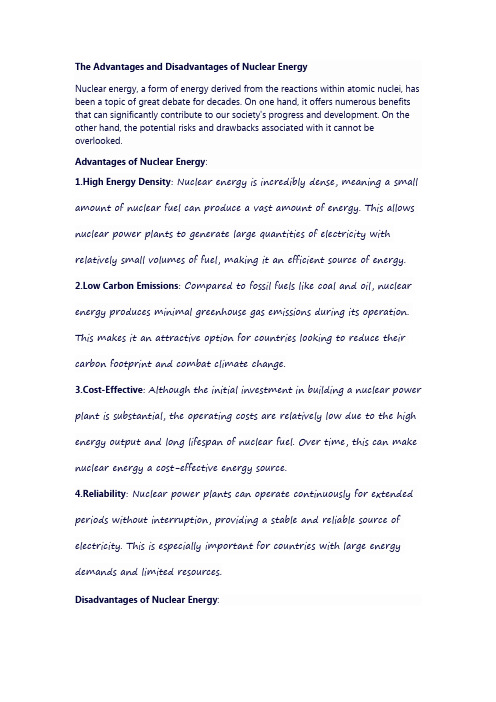
The Advantages and Disadvantages of Nuclear EnergyNuclear energy, a form of energy derived from the reactions within atomic nuclei, has been a topic of great debate for decades. On one hand, it offers numerous benefits that can significantly contribute to our society's progress and development. On the other hand, the potential risks and drawbacks associated with it cannot be overlooked.Advantages of Nuclear Energy:1.High Energy Density: Nuclear energy is incredibly dense, meaning a small amount of nuclear fuel can produce a vast amount of energy. This allows nuclear power plants to generate large quantities of electricity with relatively small volumes of fuel, making it an efficient source of energy.2.Low Carbon Emissions: Compared to fossil fuels like coal and oil, nuclear energy produces minimal greenhouse gas emissions during its operation. This makes it an attractive option for countries looking to reduce their carbon footprint and combat climate change.3.Cost-Effective: Although the initial investment in building a nuclear power plant is substantial, the operating costs are relatively low due to the high energy output and long lifespan of nuclear fuel. Over time, this can make nuclear energy a cost-effective energy source.4.Reliability: Nuclear power plants can operate continuously for extended periods without interruption, providing a stable and reliable source of electricity. This is especially important for countries with large energy demands and limited resources.Disadvantages of Nuclear Energy:1.Radioactive Waste: One of the most significant drawbacks of nuclear energy is the production of radioactive waste. This waste remains hazardous for thousands of years and requires special storage facilities to prevent contamination of the environment and harm to humans.2.Risk of Accidents: Nuclear power plants pose a risk of accidents, such as meltdowns or explosions, which can release large amounts of radioactive material into the environment. These accidents can have devastating consequences for human health and the ecosystem.3.Proliferation Concerns: Nuclear technology can be used to produce weapons-grade material, raising concerns about nuclear proliferation and the potential for nuclear war. This has led to strict international regulations and oversight of nuclear energy programs.4.Long-Term Decommissioning: When a nuclear power plant reaches the end of its lifespan, it must be decommissioned safely. This process can be expensive, time-consuming, and technically challenging, requiring specialized expertise and resources.In conclusion, nuclear energy presents both advantages and disadvantages that must be carefully considered. While it offers a clean and efficient source of energy, the potential risks and challenges associated with it cannot be ignored. It is crucial for governments and international organizations to work together to ensure the safe and responsible development of nuclear energy, addressing its drawbacks while harnessing its benefits for the benefit of society.。
nuclear energy作文带翻译
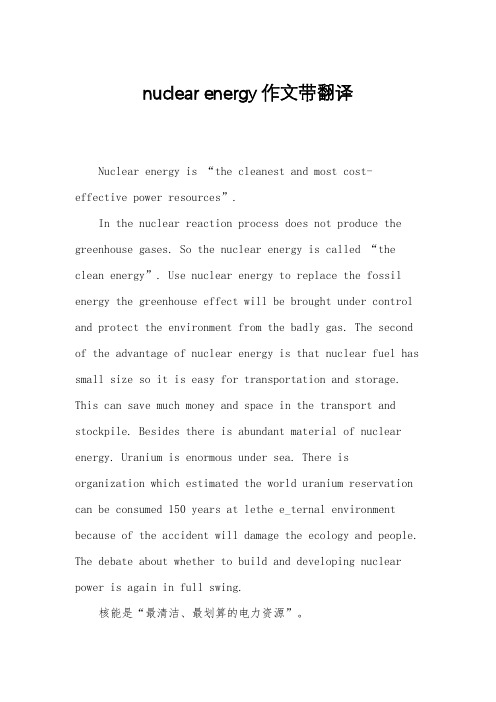
nuclear energy作文带翻译Nuclear energy is “the cleanest and most cost-effective power resources”.In the nuclear reaction process does not produce the greenhouse gases. So the nuclear energy is called “the clean energy”. Use nuclear energy to replace the fossil energy the greenhouse effect will be brought under control and protect the environment from the badly gas. The second of the advantage of nuclear energy is that nuclear fuel has small size so it is easy for transportation and storage. This can save much money and space in the transport and stockpile. Besides there is abundant material of nuclear energy. Uranium is enormous under sea. There is organization which estimated the world uranium reservation can be consumed 150 years at lethe e_ternal environment because of the accident will damage the ecology and people. The debate about whether to build and developing nuclear power is again in full swing.核能是“最清洁、最划算的电力资源”。
核能和太阳能对比英语作文
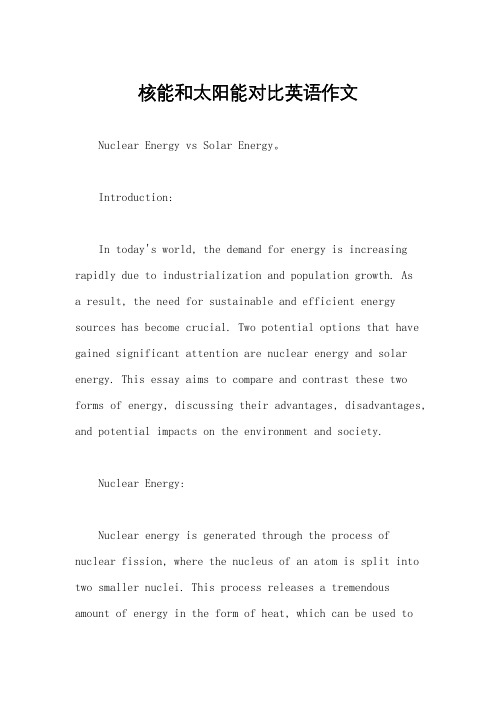
核能和太阳能对比英语作文Nuclear Energy vs Solar Energy。
Introduction:In today's world, the demand for energy is increasing rapidly due to industrialization and population growth. Asa result, the need for sustainable and efficient energy sources has become crucial. Two potential options that have gained significant attention are nuclear energy and solar energy. This essay aims to compare and contrast these two forms of energy, discussing their advantages, disadvantages, and potential impacts on the environment and society.Nuclear Energy:Nuclear energy is generated through the process of nuclear fission, where the nucleus of an atom is split into two smaller nuclei. This process releases a tremendous amount of energy in the form of heat, which can be used togenerate electricity. One of the significant advantages of nuclear energy is its high energy density. A small amount of nuclear fuel can produce a large amount of electricity, making it highly efficient.Moreover, nuclear power plants can operate continuously for extended periods, providing a stable and reliable source of energy. This is particularly important in meeting the constant energy demands of industries and households. Furthermore, nuclear energy produces minimal greenhouse gas emissions during the generation process, making it a viable option in the fight against climate change.However, nuclear energy also has several drawbacks. Firstly, the process of nuclear fission producesradioactive waste, which remains hazardous for thousands of years. Proper disposal of this waste is a significant challenge, as it requires secure storage facilities to prevent any potential harm to the environment and human health. Additionally, the construction and maintenance of nuclear power plants are costly, requiring substantial investments.Furthermore, accidents at nuclear power plants, such as the Chernobyl and Fukushima disasters, have raised concerns about the safety of nuclear energy. Although such incidents are rare, they can have severe consequences for both the environment and the surrounding population. These incidents highlight the need for strict regulations and safety measures to prevent any future mishaps.Solar Energy:Solar energy is derived from the sun and is harnessed using various technologies such as photovoltaic cells and solar thermal systems. Photovoltaic cells convert sunlight directly into electricity, while solar thermal systems use sunlight to heat water or other fluids, producing steam to generate electricity. Solar energy is a renewable source of energy, as the sun's energy is virtually limitless.One of the significant advantages of solar energy isits environmental friendliness. Solar power generation produces minimal pollution and greenhouse gas emissions,making it a clean and sustainable energy source. Additionally, solar panels can be installed on rooftops, reducing the need for vast land areas dedicated to energy production.Moreover, solar energy is abundant in most regions of the world, making it accessible to a wide range of communities. It can be particularly beneficial in remote areas where the electrical grid is not available, providing a decentralized and independent source of power. Additionally, the cost of solar panels has significantly decreased over the years, making it more affordable and economically viable for individuals and businesses.However, solar energy also has some limitations. Firstly, solar power generation is intermittent, as it depends on sunlight availability. This means that energy production may be limited during cloudy days or at night when sunlight is not available. To overcome this challenge, energy storage systems, such as batteries, are required to store excess energy generated during peak sunlight hours.Furthermore, the efficiency of solar panels is affected by various factors, including the angle and orientation of the panels, shading, and dust accumulation. Regular maintenance and cleaning are necessary to ensure optimal energy production. Additionally, the production of solar panels involves the use of rare materials and chemicals, which can have environmental impacts during the manufacturing process.Comparison:When comparing nuclear energy and solar energy, several key factors need to be considered. Firstly, in terms of energy density, nuclear energy surpasses solar energy. A small amount of nuclear fuel can produce a significant amount of electricity, while solar energy production depends on the availability of sunlight.Secondly, both forms of energy have different cost implications. Nuclear power plants require substantial investments for construction and maintenance, while solar panels have become more affordable over the years. The costof solar energy is primarily associated with the initial installation, whereas nuclear energy involves ongoing operational costs and waste management expenses.In terms of environmental impact, solar energy is considered cleaner and more sustainable compared to nuclear energy. Solar power generation produces minimal pollution and greenhouse gas emissions, while nuclear energy produces radioactive waste. Proper disposal of nuclear waste remains a challenge, whereas solar energy has no such waste byproduct.Lastly, the safety aspect is crucial when comparing these two energy sources. Nuclear energy carries the risk of accidents and potential radiation exposure, as demonstrated by past incidents. On the other hand, solar energy is considered safer and poses no direct threat to human health or the environment during the generation process.Conclusion:In conclusion, both nuclear energy and solar energy have their advantages and disadvantages. Nuclear energy offers high energy density and continuous power generation, but it comes with the challenges of radioactive waste disposal and safety concerns. Solar energy, on the other hand, is clean, renewable, and accessible, but it is intermittent and relies on sunlight availability.Ultimately, the choice between these two forms of energy depends on various factors, including geographical location, energy demands, cost considerations, and environmental priorities. A balanced and diversified energy mix that combines nuclear energy, solar energy, and other renewable sources may be the most sustainable solution to meet our growing energy needs while minimizing environmental impacts.。
英文作文核能利用
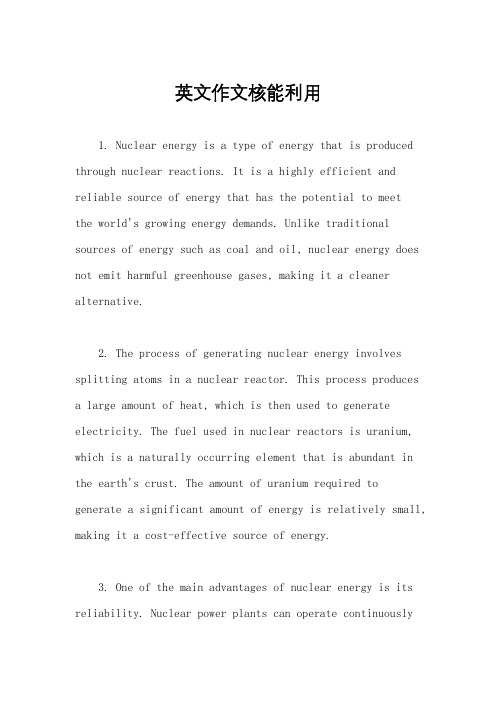
英文作文核能利用1. Nuclear energy is a type of energy that is produced through nuclear reactions. It is a highly efficient and reliable source of energy that has the potential to meetthe world's growing energy demands. Unlike traditional sources of energy such as coal and oil, nuclear energy does not emit harmful greenhouse gases, making it a cleaner alternative.2. The process of generating nuclear energy involves splitting atoms in a nuclear reactor. This process produces a large amount of heat, which is then used to generate electricity. The fuel used in nuclear reactors is uranium, which is a naturally occurring element that is abundant in the earth's crust. The amount of uranium required to generate a significant amount of energy is relatively small, making it a cost-effective source of energy.3. One of the main advantages of nuclear energy is its reliability. Nuclear power plants can operate continuouslyfor months or even years without interruption, unlike renewable energy sources such as wind and solar power,which are dependent on weather conditions. This makes nuclear energy an ideal source of base-load power, which is essential for meeting the energy demands of modern society.4. Despite its many advantages, nuclear energy also poses significant risks. The most significant risk is the potential for a nuclear accident, which can havecatastrophic consequences. The Chernobyl disaster in 1986 and the Fukushima disaster in 2011 are examples of the devastating impact that a nuclear accident can have on human health and the environment.5. To mitigate the risks associated with nuclear energy, strict safety regulations and protocols have been put in place. Nuclear power plants are subject to rigorous safety inspections and must adhere to strict safety standards. In addition, advances in technology have made nuclear reactors safer and more efficient than ever before.6. In conclusion, nuclear energy is a highly efficientand reliable source of energy that has the potential to meet the world's growing energy demands. While it poses significant risks, these risks can be mitigated through strict safety regulations and advances in technology. As the world continues to transition towards cleaner and more sustainable sources of energy, nuclear energy will undoubtedly play an important role in meeting our energy needs.。
核能的优缺点英语作文
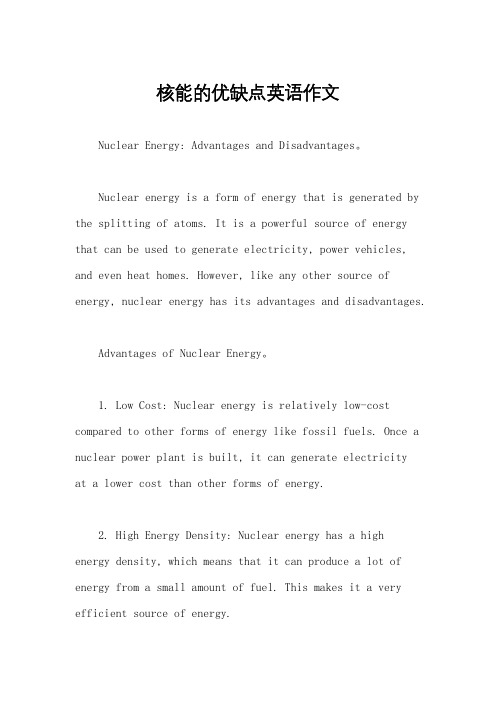
核能的优缺点英语作文Nuclear Energy: Advantages and Disadvantages。
Nuclear energy is a form of energy that is generated by the splitting of atoms. It is a powerful source of energy that can be used to generate electricity, power vehicles, and even heat homes. However, like any other source of energy, nuclear energy has its advantages and disadvantages.Advantages of Nuclear Energy。
1. Low Cost: Nuclear energy is relatively low-cost compared to other forms of energy like fossil fuels. Once a nuclear power plant is built, it can generate electricityat a lower cost than other forms of energy.2. High Energy Density: Nuclear energy has a highenergy density, which means that it can produce a lot of energy from a small amount of fuel. This makes it a very efficient source of energy.3. Reliable: Nuclear power plants can operate for long periods of time without interruption, making them areliable source of energy.4. Low Greenhouse Gas Emissions: Nuclear energy produces very low greenhouse gas emissions, making it a cleaner source of energy than fossil fuels.Disadvantages of Nuclear Energy。
英语作文核能优点与缺点

英语作文核能优点与缺点Advantages and Disadvantages of Nuclear Energy。
Nuclear energy has been a topic of debate for many years, with proponents arguing that it is a clean and efficient source of power, while opponents raise concerns about safety and environmental impact. In this essay, we will explore the advantages and disadvantages of nuclear energy.Advantages:1. Clean Energy: One of the main advantages of nuclear energy is that it is a clean source of power. Unlike fossil fuels, which release harmful greenhouse gases into the atmosphere, nuclear power plants produce minimal emissions.2. High Energy Output: Nuclear energy is extremely efficient, producing a large amount of energy from a small amount of fuel. This means that nuclear power plants cangenerate a significant amount of electricity without the need for large amounts of fuel.3. Reliability: Nuclear power plants are highly reliable sources of energy, operating at a high capacity factor and providing a consistent source of power.4. Low Operating Costs: While the initial construction costs of nuclear power plants can be high, the operating costs are relatively low. This makes nuclear energy a cost-effective option for generating electricity.5. Energy Security: Nuclear energy provides a reliable source of energy that is not dependent on foreign imports, reducing the risk of supply disruptions.Disadvantages:1. Safety Concerns: One of the main disadvantages of nuclear energy is the risk of accidents. While modern nuclear power plants are designed with safety in mind, accidents can still occur, as seen in the Chernobyl andFukushima disasters.2. Nuclear Waste: Nuclear power plants produce radioactive waste that remains hazardous for thousands of years. Disposing of this waste safely is a major challenge and raises concerns about environmental contamination.3. Non-renewable: Nuclear energy is a non-renewable resource, as it relies on uranium and other finite fuel sources. This raises concerns about the long-term sustainability of nuclear power.4. Security Risks: Nuclear power plants are potential targets for terrorist attacks, posing a risk to public safety and national security.5. Public Perception: Nuclear energy has a negative public perception due to safety concerns and the association with nuclear weapons. This can make itdifficult to gain public acceptance for new nuclear power projects.In conclusion, nuclear energy has both advantages and disadvantages. While it is a clean and efficient source of power, safety concerns, nuclear waste, and public perception remain significant challenges. It is important to weigh these factors carefully when considering the role of nuclear energy in the future energy mix.。
如何利用核能的英语作文
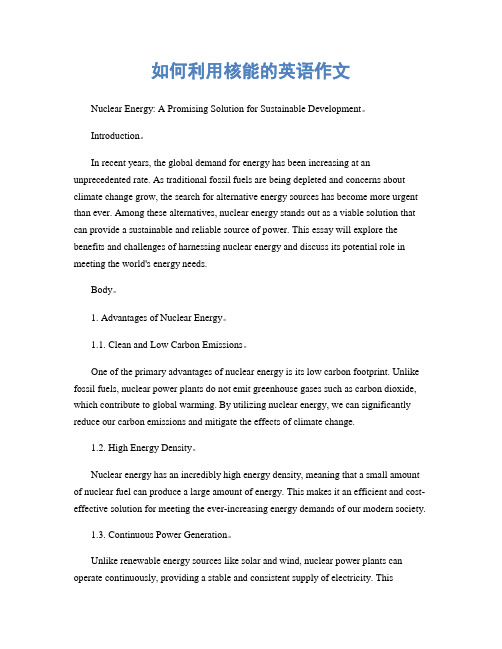
如何利用核能的英语作文Nuclear Energy: A Promising Solution for Sustainable Development。
Introduction。
In recent years, the global demand for energy has been increasing at an unprecedented rate. As traditional fossil fuels are being depleted and concerns about climate change grow, the search for alternative energy sources has become more urgent than ever. Among these alternatives, nuclear energy stands out as a viable solution that can provide a sustainable and reliable source of power. This essay will explore the benefits and challenges of harnessing nuclear energy and discuss its potential role in meeting the world's energy needs.Body。
1. Advantages of Nuclear Energy。
1.1. Clean and Low Carbon Emissions。
One of the primary advantages of nuclear energy is its low carbon footprint. Unlike fossil fuels, nuclear power plants do not emit greenhouse gases such as carbon dioxide, which contribute to global warming. By utilizing nuclear energy, we can significantly reduce our carbon emissions and mitigate the effects of climate change.1.2. High Energy Density。
核能比其他能源资源更好吗英语作文

核能比其他能源资源更好吗英语作文Nuclear Energy: Is it Better than Other Energy Resources?In recent years, the global demand for energy has been rapidly increasing, leading to a growing concern about the sustainability and efficiency of different energy resources. Among them, nuclear energy has emerged as a controversial topic. Some argue that nuclear energy is superior to other energy resources, while others have reservations about its safety and environmental impact. This article aims to explore the advantages of nuclear energy compared to other energy resources.To begin with, one of the most significant advantages of nuclear energy is its high energy density. Unlike fossil fuels such as coal and oil, which require large quantities to produce a significant amount of energy, nuclear power plants can generate a substantial amount of electricity from a small amount of uranium or plutonium. This high energy density makes nuclear energy a more efficient and cost-effective option in the long run.Another advantage of nuclear energy is its low greenhouse gas emissions. As the world grapples with the challenges of climate change, finding low-carbon energy sources has become crucial. Nuclear power plants do not emit carbon dioxide during electricity generation, making them a viable solution to reduce greenhouse gas emissions. In comparison, fossil fuel power plants are major contributors to global warming and air pollution.Furthermore, nuclear energy offers a stable and reliable power supply. Unlike renewable energy sources like solar and wind, which are dependent on weather conditions, nuclear power plants can operate consistently, providing a steady flow of electricity. This reliability is particularly important in meeting the demands of industries and households, ensuring a stable energy supply for economic development and daily activities.Additionally, nuclear energy plays a vital role in diversifying the energy mix. Overreliance on a single energy resource, such as fossil fuels, poses risks to energysecurity and stability. By incorporating nuclear energy into the energy portfolio, countries can reduce their dependence on finite and depleting resources, enhancing energy independence and resilience.Moreover, nuclear energy has the potential to address the issue of energy poverty. Many developing countries struggle to provide electricity to their populations, hindering economic growth and social development. Nuclear power plants can bridge this gap by offering a reliable and affordable source of electricity, improving living conditions and promoting sustainable development.However, it is essential to acknowledge the concerns associated with nuclear energy. Safety is a paramount issue, as demonstrated by incidents such as the Chernobyl and Fukushima disasters. Strict regulations, robust safety measures, and continuous monitoring are necessary to prevent accidents and ensure the protection of both humans and the environment. Additionally, the management of nuclear waste remains a challenge, requiring long-term solutions for safe storage and disposal.In conclusion, nuclear energy has several advantages compared to other energy resources. Its high energy density, low greenhouse gas emissions, reliability, diversification potential, and ability to address energy poverty make it an attractive option. However, safety and waste management issues must be effectively addressed to maximize the benefits of nuclear energy. As the world seeks sustainable and efficient energy solutions, a balanced and informed approach is crucial in evaluating the role of nuclear energy in the global energy mix.。
关于核能的英语作文
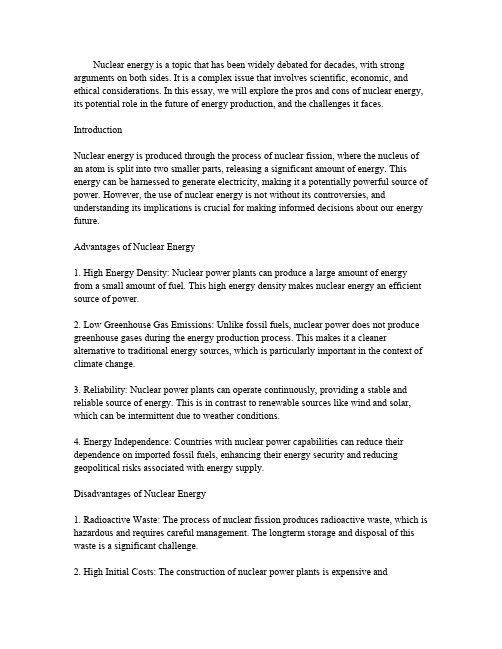
Nuclear energy is a topic that has been widely debated for decades,with strong arguments on both sides.It is a complex issue that involves scientific,economic,and ethical considerations.In this essay,we will explore the pros and cons of nuclear energy, its potential role in the future of energy production,and the challenges it faces.IntroductionNuclear energy is produced through the process of nuclear fission,where the nucleus of an atom is split into two smaller parts,releasing a significant amount of energy.This energy can be harnessed to generate electricity,making it a potentially powerful source of power.However,the use of nuclear energy is not without its controversies,and understanding its implications is crucial for making informed decisions about our energy future.Advantages of Nuclear Energy1.High Energy Density:Nuclear power plants can produce a large amount of energy from a small amount of fuel.This high energy density makes nuclear energy an efficient source of power.2.Low Greenhouse Gas Emissions:Unlike fossil fuels,nuclear power does not produce greenhouse gases during the energy production process.This makes it a cleaner alternative to traditional energy sources,which is particularly important in the context of climate change.3.Reliability:Nuclear power plants can operate continuously,providing a stable and reliable source of energy.This is in contrast to renewable sources like wind and solar, which can be intermittent due to weather conditions.4.Energy Independence:Countries with nuclear power capabilities can reduce their dependence on imported fossil fuels,enhancing their energy security and reducing geopolitical risks associated with energy supply.Disadvantages of Nuclear Energy1.Radioactive Waste:The process of nuclear fission produces radioactive waste,which is hazardous and requires careful management.The longterm storage and disposal of this waste is a significant challenge.2.High Initial Costs:The construction of nuclear power plants is expensive andtimeconsuming.This high initial cost can be a barrier to entry for many countries.3.Risk of Accidents:While the safety measures in nuclear power plants have improved over the years,the potential for catastrophic accidents remains.The disasters at Chernobyl and Fukushima have highlighted the devastating consequences of such accidents.4.Proliferation Concerns:The technology and materials used in nuclear power can potentially be diverted for the development of nuclear weapons,raising security concerns.Future of Nuclear EnergyThe future of nuclear energy is closely tied to advancements in technology.New designs, such as small modular reactors SMRs and Generation IV reactors,aim to address some of the current challenges,including cost,safety,and waste management.Additionally, research into fusion power,which is considered the holy grail of clean energy,could potentially revolutionize the energy sector.ConclusionNuclear energy is a complex and controversial topic.While it offers significant benefits in terms of energy density,low greenhouse gas emissions,and reliability,it also presents challenges related to waste management,high costs,and safety concerns.As we look to the future,it is essential to weigh these factors carefully and continue to invest in research and development to harness the potential of nuclear energy in a safe and sustainable manner.The decision to embrace nuclear energy should be made with a clear understanding of its implications and a commitment to addressing its challenges headon.。
核能优点英语作文
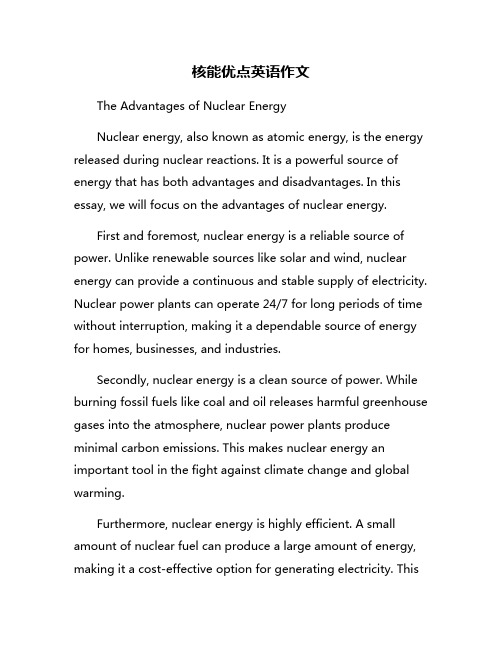
核能优点英语作文The Advantages of Nuclear EnergyNuclear energy, also known as atomic energy, is the energy released during nuclear reactions. It is a powerful source of energy that has both advantages and disadvantages. In this essay, we will focus on the advantages of nuclear energy.First and foremost, nuclear energy is a reliable source of power. Unlike renewable sources like solar and wind, nuclear energy can provide a continuous and stable supply of electricity. Nuclear power plants can operate 24/7 for long periods of time without interruption, making it a dependable source of energy for homes, businesses, and industries.Secondly, nuclear energy is a clean source of power. While burning fossil fuels like coal and oil releases harmful greenhouse gases into the atmosphere, nuclear power plants produce minimal carbon emissions. This makes nuclear energy an important tool in the fight against climate change and global warming.Furthermore, nuclear energy is highly efficient. A small amount of nuclear fuel can produce a large amount of energy, making it a cost-effective option for generating electricity. Thisefficiency also means that nuclear power plants require less fuel and produce less waste compared to other forms of energy generation.In addition, nuclear energy is relatively safe. While accidents like the Chernobyl and Fukushima disasters have raised concerns about the safety of nuclear power, modern nuclear power plants are designed with multiple safety features to prevent such incidents. The risk of a major accident at a nuclear power plant is low, and the industry continues to improve safety standards and technology to minimize the possibility of accidents.Another advantage of nuclear energy is its energy independence. Countries that rely on nuclear power for their electricity needs are less reliant on imported fossil fuels, reducing their vulnerability to fluctuations in fuel prices and supply disruptions. This can lead to greater energy security and stability for these countries.In conclusion, nuclear energy has many advantages that make it a valuable source of power. It is reliable, clean, efficient, safe, and promotes energy independence. While there are challenges and concerns associated with nuclear energy, it is clear that the benefits outweigh the drawbacks. As our world continues to seek sustainable and low-carbon energy sources,nuclear energy will play an important role in meeting our energy needs.。
